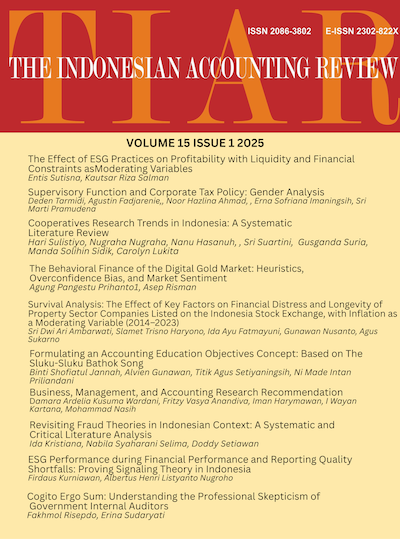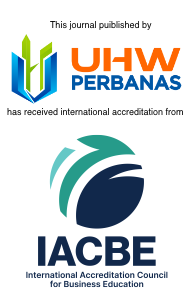Formulating an Accounting Education Objectives Concept: Based on The Sluku-Sluku Bathok Song
DOI:
https://doi.org/10.14414/tiar.v15i1.5115Keywords:
Accounting, Agency Theory, Rational-ism, Sluku-sluku bathokAbstract
This study is motivated by indicating that accounting is vulnerable to using only rational reason. The dominance of rational reason in accounting education is inseparable from the agency theory taught by accounting educators. Therefore, this study aims to build a concept of accounting education objectives based on the “sluku-sluku bathok” song. This study uses Fairclough's (1992) discourse analysis, which includes text analysis, discursive practices, and social practices. The text analysis stage identifies the lyrics of the "sluku-sluku bathok" song. The discursive practice stage is to interpret the "sluku-sluku bathok" song. The social practice stage is to explore how this song reflects the values of Javanese society. As a result, the objectives of accounting education are complete with values. First, accounting education is a process of seeking actual knowledge. Second, accounting education balances dhikr and thought. Third, accounting education is about gaining pleasure in the world and the hereafter. The "pleasure” in question is the true pleasure of meeting God in the hereafter. The results of this study open up a new path in accounting education, with the hope of producing accounting professionals who not only have technical competence but are also strong in character building and can balance worldly and spiritual aspects.
References
Achilli, G., Busco, C., & Giovannoni, E. (2022). Ac-counting for the “transcendent self”: spirituality, narcissism, testimony and gift. Accounting, Audit-ing and Accountability Journal, 35(2), 492–517. https://doi.org/10.1108/AAAJ-12-2019-4360/FULL/XML
Aneswari, Y. R., & Musmini, L. S. (2017). Quo Va-dis Pancasila Dalam Pendidikan Akuntansi? Jur-nal Akuntansi Multiparadigma, 8(1), 149–165. https://doi.org/10.18202/JAMAL.2017.04.7045
Arifin, M. (2018). Epistemologi Rasionalisme Rene Descartes Dan Relevansinya Terhadap Penafsiran Al-Qur`An. Jurnal Ilmiah Ilmu Ushuluddin, 17(2), 147–157. https://doi.org/10.18592/JIU.V17I2.2240
Astutik, A. (2024). ESTABLISHING SHOLAWAT THROUGH HADRAH ART ACTIVITIES IN MADRASAS. Proceeding of International Con-ference on Education, Society and Humanity, 2 (1), 1323–1328. https://ejournal.unuja.ac.id/index.php/icesh/article/view/8042
Bakhtiar, Y. (2018). Kontemplasi Tujuan Pendidikan Akuntansi: Interpretasi Makna Berbagai Perspektif. JIAI (Jurnal Ilmiah Akuntansi Indonesia), 3(1). https://doi.org/10.32528/jiai.v3i1.1677
Bourdieu, P. (2010). Dominasi Maskulin. Terjemahan S.A Her-winarko. Jalasutra.
Cahyono, S., & Sudaryati, E. (2023). The Spirituality Ethics on Accountant: An Islamic Moralities Per-spective. Journal Of Applied Managerial Account-ing, 7(2), 328–337. https://doi.org/10.30871/JAMA.V7I2.5518
Choiriyah, N. (2014). Rasionalisme Rene Descartes. Anterior Jurnal, 13(2), 237-243–237–243. https://doi.org/10.33084/ANTERIOR.V13I2.284
Dellaportas, S. (2015). Reclaiming ‘Sense’ from ‘Cents’ in Accounting Education. Accounting Education, 24(6), 445–460. https://doi.org/10.1080/09639284.2015.1114456
Dewi, T. P., Purwadi, P., & Mudzanatun, M. (2019). Analisis Nilai Karakter Religius dan Nilai Karakter Tanggung Jawab Pada Tembang Dolanan Lir-ilir dan Sluku-Sluku Bathok. SEMAR (Jurnal Ilmu Pengetahuan, Teknologi, Dan Seni Bagi Masyara-kat), 8(1). https://doi.org/10.20961/semar.v8i1.18044
Dhalu, M. A. (2020). Penanaman Nilai-Nilai Budi Pekerti Melalui Tembang Dolanan Anak-Anak Pa-da Anak Usia Dasar. Edu-Religia : Jurnal Keaga-maan Dan Pem-Belajarannya, 3(2), 14–22.
Djuharni, D., Alimin Azis, N., STIE Malangkuçeçwara, ab, Terusan Kalasan Malang, J., Patria Artha, U., Tun Abdul Razak, J., & Selatan, S. (2019). Inter-nalisasi nilai “ilir-ilir” pada pendidikan akuntansi: Dari “sandang” menuju “ageman.” Imanensi: Jur-nal Ekonomi, Manajemen, Dan Akuntansi Islam, 4(2), 24–43. https://doi.org/10.34202/IMANENSI.4.2.2019.24-43
Efferin, S., & Hutomo, C. C. (2021). Spirituality, hap-piness and auditors’ commitment: an interbeing perspective. Accounting, Auditing and Accounta-bility Journal, 34(4), 701–730. https://doi.org/10.1108/AAAJ-01-2020-4385/FULL/XML
Ekasari, K. (2012). [Re]Konstruksi Pendidikan Akuntan-si di Tingkat Pendidikan Vokasi, Melalui Episte-mologi 3ling.
Ekasari, K. (2014). Rehumanisasi Pendidikan Akuntansi melalui Pendekatan Epistemologi 3ling. Jurnal Akuntansi Multiparadigma, 5(2). https://doi.org/10.18202/jamal.2014.08.5016
Fairclough, N. (1992). Discourse and Text: Linguistic and Intertextual Analysis within Discourse Analy-sis. Http://Dx.Doi.Org/10.1177/0957926592003002004, 3(2), 193–217. https://doi.org/10.1177/0957926592003002004
Fendi, M. F., Kashai, M., & Pelupessy, R. (2023). “Membentuk Jati Diri Akuntan” Melalui Nilai Keagamaan. JURNAL EKSPLORASI AKUNTAN-SI, 5(3), 1011–1022. https://doi.org/10.24036/JEA.V5I3.879
Fikri, M. (2018). Rasionalisme Descartes dan Im-plikasinya Terhadap Pemikiran Pembaharuan Islam Muhammad Abduh. TARBAWI : Jurnal Pendidi-kan Agama Islam, 3(02), 128–144. https://doi.org/10.26618/JTW.V3I02.1598
Fukofuka, P., Scobie, M., & Finau, G. (2023). Indige-nous practices of accounting on the ground: a Bourdieusian perspective. Accounting, Auditing and Accountability Journal, 36(1), 96–119. https://doi.org/10.1108/AAAJ-11-2021-5529/FULL/XML
Gunarathne, A. D. N., & Rajasooriya, S. (2019). Thera-vada Buddhist Ways of Thinking : Reflections on sustainability accounting education in a public university in Sri Lanka. Prioritizing Sustainability Education, 141–157. https://doi.org/10.4324/9780429021800-11
Haniffa, R., & Hudaib, M. (2007). Exploring the ethical identity of Islamic Banks via communication in annual reports. Journal of Business Ethics, 76(1), 97–116. https://doi.org/10.1007/S10551-006-9272-5
Hayati, N. (2018). Pesan Kehidupan Dalam Lirik Lagu Shalawat Bahasa Jawa. SHAHIH: Journal of Islam-icate Multidisciplinary, 3(1), 21–32. https://doi.org/10.22515/SHAHIH.V3I1.1018
Hocking, D. E. , M. M. D. , & C. S. N. (2019). To-ward a Model for the Use of Spirituality in Teach-ing Accounting. Journal of Academic and Busi-ness Ethics, 1, 1–12.
Inayati, K. F., Millah, A. S., Inayati, K. F., & Millah, A. S. (2016). Islamic Education and Multiple In-telligences Implementation in Traditional Game of Sluku-Sluku Bathok at Komunitas Pojok Bu-daya, Bantul of Yogyakarta. Jurnal Pendidikan Is-lam, 5(1), 193–121. https://doi.org/10.14421/JPI.2016.51.193-121XXX
Jannah, B. S. (2023). Is It Important To Integrate Islam-ic Values In Accounting Education? JAS (Jurnal Akuntansi Syariah), 7(1), 30–41. https://doi.org/10.46367/jas.v7i1.1050
Jensen, M. C. , & Meckling, W. H. (1976). Theory of the firm: Managerial behavior, agency costs and ownership structure. Journal of Financial Econom-ics, 3(4), 305–360.
Kamayanti, A. (2016). Integrasi Pancasila Dalam Pen-didikan Akuntansi Melalui Pendekatan Dialogis. Journal of Accounting and Business Education, 2(2). https://doi.org/10.26675/jabe.v2i2.6063
Kartanegara, M. (2003). Menyibak Tirai Kejahilan Pen-gantar Epistemologi Islam. Mizan.
Kompyurini, N., & Wulandari, A. (2022). The Spirit Of Pancasila In Revolution Of Accounting Education. In The International Journal of Accounting and Business Society (Vol. 30, Issue 1).
McPhail, K., & Cordery, C. J. (2019). Theological per-spectives on accounting: worldviews don’t change overnight. Accounting, Auditing and Accountabil-ity Journal, 32(8), 2330–2352. https://doi.org/10.1108/AAAJ-03-2018-3415/FULL/XML
Molisa, P. (2011). A spiritual reflection on emancipation and accounting. Critical Perspectives on Account-ing, 22(5), 453–484. https://doi.org/10.1016/J.CPA.2011.01.004
Mulawarman, A. D. (2012). Pendidikan Akuntansi Indo-nesia: Pro Neoliberal Atau Pancasila?
Musakkir, M. (2021). Filsafat Modern Dan Perkem-bangannya (Renaissance: Rasionalisme dan Em-perisme). TAJDID: Jurnal Pemikiran Keislaman Dan Kemanusiaan, 5(1), 1–12. https://ejournal.iaimbima.ac.id/index.php/tajdid/article/view/626
Saptawuryandari, N. (2019). Dolanan Anak Song As A Heritage And Cultural Identity: Globalization Challenges. Proceeding of The International Con-ference on Literature, 1(1), 357–368. https://doi.org/10.24815/.V1I1.14450
Setiawan, A. R., & Kamayanti, A. (2012). Mendobrak Reproduksi Dominasi Maskulinitas dalam Pendi-dikan Akuntansi: Internalisasi Pancasila dalam Pembelajaran Accounting Fraud. Konferensi Na-sional Pendidikan Akuntansi Indonesia.
Sitorus, J. H. E. (2019). The romance of modern ac-counting education: an impact from positivism and materialism. Global Business and Economics Re-view, 21(1), 78–95. https://ideas.repec.org/a/ids/gbusec/v21y2019i1p78-95.html
Sunyoto, A. (2019). Atlas Wali Songo. Pustaka IIMaN.
Triyuwono, I. (2010). ”Mata Ketiga”: Sè Laèn, Sang Pembebas Sistem Pendidikan Tinggi Akuntansi. Jurnal Akuntansi Multiparadigma, 1(1), 1–23. https://doi.org/10.18202/JAMAL.2010.04.7077
Triyuwono, I. (2015). Awakening the Conscience Inside: The Spirituality of Code of Ethics for Professional Accountants. Procedia - Social and Behavioral Sciences, 172, 254–261. https://doi.org/10.1016/J.SBSPRO.2015.01.362
Yakin, F. E., Kristiani, A., & Hendrik, S. (2025). From the Puppet Screen to the Accounting World: Inte-grating Semar’s Philosophy and Islamic Spirituali-ty in the Profession of Accountant Educators. In-donesian Interdisciplinary Journal of Sharia Eco-nomics (IIJSE), 8(2), 3316–3331. https://doi.org/10.31538/MJIFM.V3I1.35
Yessica, Y., & Efferin, S. (2022). WORK LIFE HAR-MONY AKUNTAN: KAPAN DAN MENGAPA? EKUITAS (Jurnal Ekonomi Dan Keuangan), 6(2), 180–202. https://doi.org/10.24034/j25485024.y2022.v6.i2.4275
Downloads
Submitted
Published
How to Cite
Issue
Section
License
Copyright (c) 2025 The Indonesian Accounting Review

This work is licensed under a Creative Commons Attribution-NonCommercial 4.0 International License.

















